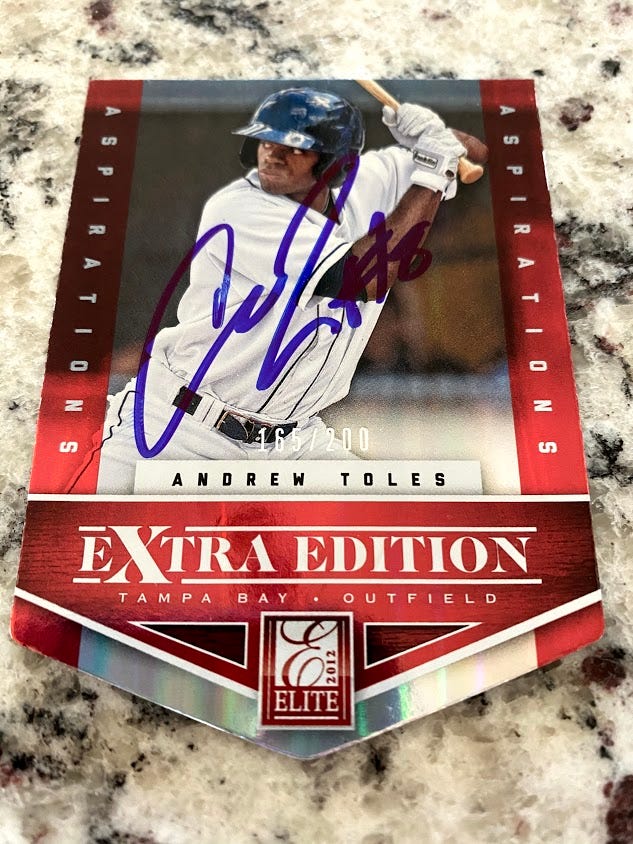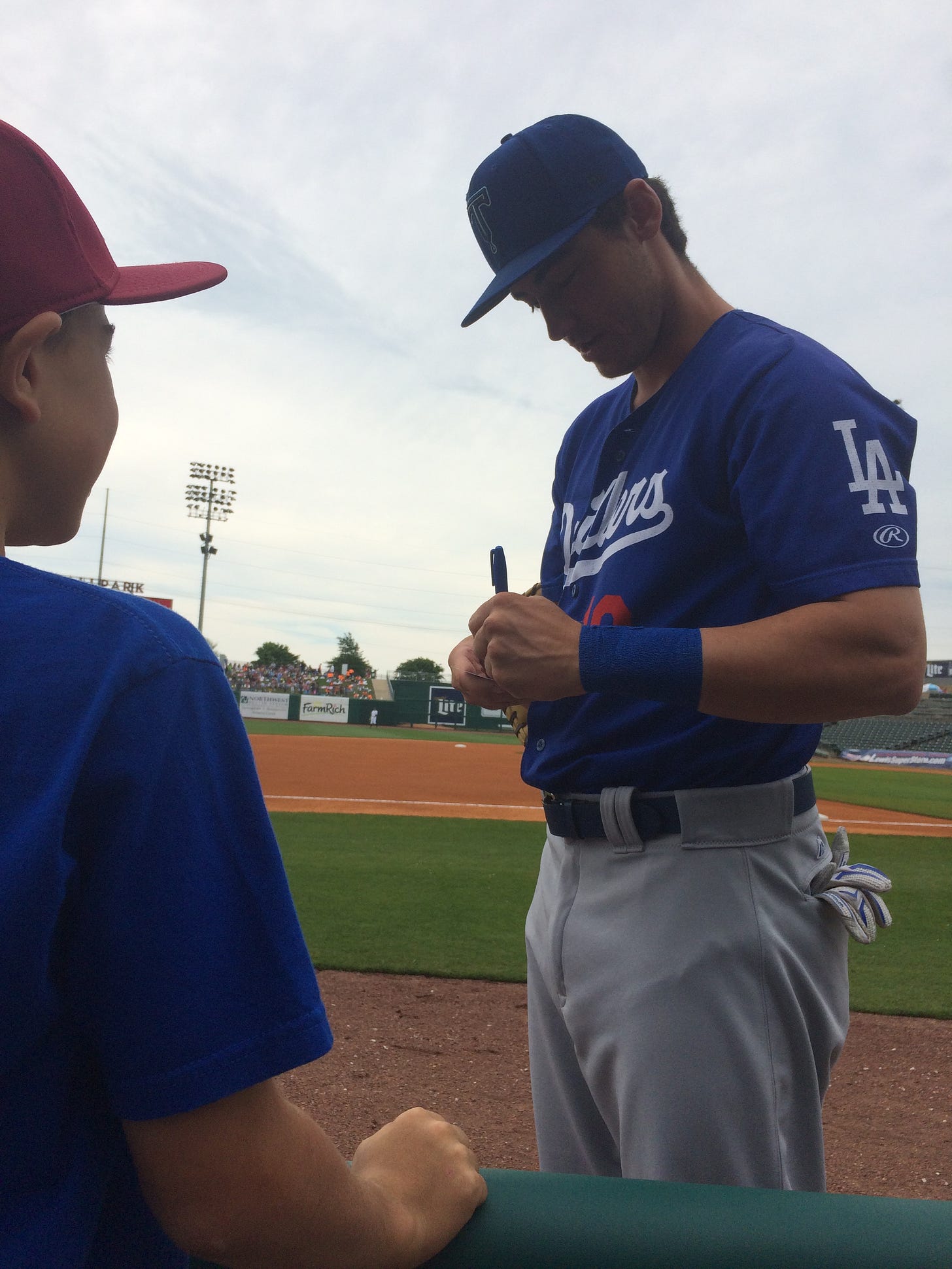Why I am rooting for Andrew Toles
Baseball, autographs, and mental health
During the summers of 2015-19, my son and I attended a lot of minor league baseball games at Arvest Ballpark. Primarily we did this to get autographs of players from the Dodgers’ AA team, the Tulsa Drillers. I remember my dad taking me to a car dealership somewhere in Southern California in 1975-ish to get Steve Garvey’s autograph (I still have it). He was my favorite player for obvious reasons: we had the same first name.
It was that type of father-son outing I was hoping my son will remember when he thinks about the many trips to watch the Drillers. Tulsa visited Northwest Arkansas four times per year. I prepared for these excursions by reviewing who was on the Tulsa and Rancho Cucamonga rosters (you never know who might get called up before the next visit). I then scoured eBay for baseball cards of these players.
We still reminisce of seeing Cody Bellinger before he was crushing dingers at Dodger Stadium. Of having a pleasant conversation with Walker Buehler before his 99 mph fastball was dominating hitters in a World Series. Will Smith. Corey Seager. Julio Urias. They were the core of the 2020 World Champion Los Angeles Dodgers (it is fun to type that). We have their autographs on baseball cards.
In April 2016, a player I had never heard of was tearing up Rancho. Predictably, his baseball card was not easy to find. You see, Andrew Toles was out of baseball in 2015. He had spent some of that year working at an Atlanta-area Kroger. After 22 games in Rancho, where he hit .374, he was promoted to Tulsa. Fortunately, I had ordered the only $5 card I could find on eBay, an odd-shaped, numbered card from 2012. We had something for the next visit.
Our MO to getting autographs was always the same. Wear Dodgers gear. Buy tickets as close to the field as possible next to the visiting Drillers dugout. Arrive an hour early so we could wait for the players to come out for their pregame stretches. As the players emerged from the dugout, my son would hold up his card and a blue sharpie (we used black in 2015 but switched to blue after that season. Always use blue.), and call “Mr. Toles” (or whomever the player was).
Without fail, the players were accommodating. No one else in Northwest Arkansas was bugging them for autographs. We have dozens of signatures of players who never made it the Major Leagues. Andrew Toles was not one of them.
I remember Toles looking back at my son in a manner which suggested surprise that someone identified him on May 23, 2016 in Springdale, Arkansas. He was quiet and shy, but politely signed the card above, with his Drillers number 8. Toles was stoic in warmups and on the field, very business-like. His high socks stood out, perhaps a nod to the Negro Leagues.
The 2016 Tulsa Drillers were loaded with Major League talent. Bellinger, Toles, Alex Verdugo, Kyle Farmer, Willie Calhoun, and Edwin Rios all logged time that season. In fact, 24 of the 47 players to suit up for Tulsa that year have appeared in the bigs. For Toles, Tulsa was just a place to spend a few weeks in between A-ball Rancho and AAA-ball Oklahoma City, before eventually being summoned to Los Angeles and his Dodger debut on July 8, 2016. He was on the fastest of fast tracks.
Toles quickly endeared himself to Dodger fans in 2016 with his performance on the field, earning the nickname “Tolesy.” He was a regular contributor down the stretch, playing all three outfield positions, occasionally crashing into the wall to make a catch. He showed a rare display of emotion after hitting a grand slam home run against the Rockies. He slashed .364/.423/.455 during the 2016 playoffs. He was assigned number 60, hardly the number of an everyday position player, yet he didn’t change it the next season. He was the Dodgers Opening Day leftfielder and leadoff batter in 2017, and was off to a solid start, when it all went wrong.
I was watching the game against the Pirates at Dodger Stadium on May 9, 2017. Julio Urias had a no-hitter through six innings and was facing Andrew McCutcheon, who stroked a line drive down the left field line. Toles gave chase at high speed. As he realized the ball would drop in, he slowed to avoid crashing into the short wall in left. It was then that he tore his right ACL.
Athletes overcome injuries in all sports all the time and while I was immediately sad for Toles, and for the Dodgers who would need to replace him in the lineup, I figured he could be back sometime next year. Indeed, he made his Los Angeles debut on July 9, 2018 and lasted a week before the Dodgers sent him to the minors. He was called up in September 2018 and on September 29 he pinch hit for Clayton Kershaw against the Giants and singled. The next day he was inserted in centerfield for the bottom of the ninth in a 15-0 Dodgers rout.
Andrew Toles has not played a professional baseball game since that day, September 30, 2018. Last summer, on June 27, 2020, he was charged with trespassing in Key West, Florida for sleeping behind a building at the airport.
Three days later, his family went public, pleading for Toles to get help. His sister disclosed he had been in 20 mental health facilities since 2019. The Dodgers had placed him on the restricted list for the 2019 season as he sought help. The family acknowledged he was diagnosed with bipolar disorder and schizophrenia. Toles had discussed his history of anxiety with Michael Duarte of KNBC-TV in a 2018 interview and seemed to imply he was beating it.
Information on Toles’ condition, let alone his whereabouts, was, and still is, nearly impossible to find. The media have not followed up on his situation. Perhaps that it is out of respect for privacy. Perhaps they have tried and cannot reach him.
Following his arrest, his lawyer regularly filed motions for pretrial continuance. Just last week, on February 19, the state attorney filed a Nolle Prosequi in the case, paving the way for charges to be dropped. Dennis W. Ward, the state attorney, provided the following reason for his filing: “Defendant was and currently is suffering from mental health issues. Since his arrest steps have been taken to address these issues including lengthy inpatient treatment.” That would explain the continuance requests. No further information was provided. Toles’ next court appointment is March 3.
I was relieved to know Toles was getting help, and I sincerely hope that it works. I do not know Toles, except for our brief interaction on May 23, 2016, nor do I know his family. I am a baseball and Dodgers fan, so, of course, this story hits closer to home for me. But I am also a father and husband who tries really hard to model behavior as an empathetic human being, treating strangers with respect. We all have our personal challenges and I try to remember that I do not know what someone else is going through when I meet that person.
Mental health issues are critically important to our society. We should not stigmatize individuals confronted with challenges such these. We should lend them support and encourage them to seek help from professional counselors.
Athletes grow up with their identities wrapped up in being an athlete. They can be lionized on high school campuses. Colleges even single them out as “student-athletes” so as to denote their different status from being just a “student.” Kids and adults (my house is guilty) want their autographs. Academic literature increasingly focuses on this phenomenon of athlete identity and what happens when that identity is discontinued or taken away.
In the past year, thousands of athletes at every level are having their athletic identity involuntarily taken away from them as a pandemic rages, canceling seasons and watching as universities discontinue sports. ESPN’s Jeff Passan’s story of Drew Robinson earlier this month is one such story. It is a tough, but important read. The mental health challenges associated with this pandemic are not hard to spot - a quick Google search will give you hours of evidence-based reading.
For most people, seeing the name Andrew Toles or Drew Robinson sent down to the minors in the newspaper agate barely registers. But behind each roster transaction in sports is a human being. And a story. The stories I am rooting for this year involve Andrew Toles and Drew Robinson.
As spring training gets underway, and hope springs eternal for a “normal-ish” summer, let’s pause to think how we react when we ask someone “how are you?” or “hope you are doing well.” Do we want an honest answer? And are we prepared to help someone when we get an honest answer.




